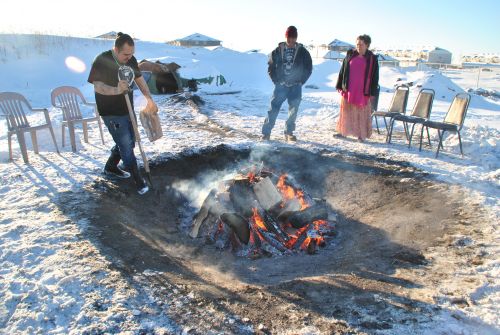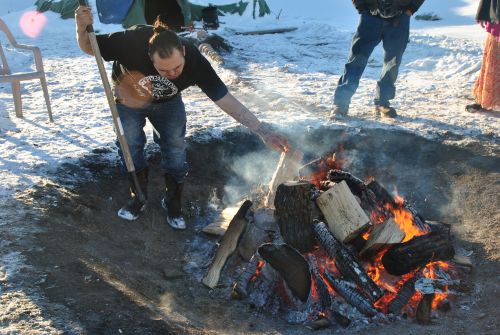News | February 23rd, 2018
 FARGO – Water sizzles against scorched stones piled in a shallow pit center of Fargo’s only Indigenous sweat lodge. Faces gleam briefly before the glow fades, and the Native songs begin. Packed side by side, Anishinaabe, Spirit Lake, Mandan, Hidatsa, and Arikara, and a few wasi’chu – or white people – sing to the four directions, and for guidance in troubled times.
FARGO – Water sizzles against scorched stones piled in a shallow pit center of Fargo’s only Indigenous sweat lodge. Faces gleam briefly before the glow fades, and the Native songs begin. Packed side by side, Anishinaabe, Spirit Lake, Mandan, Hidatsa, and Arikara, and a few wasi’chu – or white people – sing to the four directions, and for guidance in troubled times.
One year after Fargo police pulled Native Americans out of the sweat lodge for what they thought was an unauthorized fire, little has changed despite promises to improve the area. Two portable toilets, a changing room with no heat, remain. The lodge itself is simply made, shaped into a dome with saplings, covered in blankets, sagging a little lower since last winter.
Tinged by cedar, the heat inside the lodge is far greater than any health club’s sauna. Sweat pours from the skin cleansing impurities during the first door, or round. Rocks are doubled for the second door, and the heat intensifies, as do the prayers. Voices rise and fall in song, drums beat; there’s no mistaking a ceremony of some importance is underway.
The memory of that night on February 23, 2017, still pains Zebadiah Gartner, 21, an Anishinaabe from Fargo. Dressed in shorts, shirtless, he was arrested for resisting arrest and says he was beaten. Others, including young children and several elderly people, were forced to stand in the cold while police recorded information. Some, who were present that night, have not returned for the ceremony, Gartner said.
“The way I feel about it is they talk a good talk, they say a lot of good things, but when it comes right to it, they would refer to it as a mud hole,” Gartner said of the sweat lodge area. “Nothing has been done out there, not a thing.”
He believes Indigenous issues are treated with some scorn.
“It has to do with who we are as a people,” Gartner said. “Fargo supported a lot of the police out in Standing Rock. A lot of people don’t want to say that, but I’m not afraid to say anything. I am very disappointed.”
Despite Indigenous cultural training city employees have underwent, one police officer gave him a rude hand signal while he was walking near West Acres recently, Gartner said.
“A lot of people are wary about things going on, the police and safety,” Gartner said. “We cover our part, and our protocols to keep people safe. What happened last year, I would do it again, for anybody. But it’s not about me, it’s about water protectors, that’s what it all comes down to, what we were all praying about that night.”

Although the sweat lodge area remains the same, some changes have been made in city departments.
“The incident itself was unfortunate, and I wish that wouldn’t have happened,” Fargo Police Chief David Todd said. “We didn’t really know where that location was and one of our younger officers mistook it. Certainly we are looking for some healing in that, but we have put all our folks in diversity training, a citywide diversity training that all city employees have gone through.”
Now, city departments are notified every time organizers conduct a public sweat.
Another reason for delays is that the lodge area may be moved to a better location.
Former city cultural planner, Willard Yellowbird, who recently retired after 17 years, said he was involved in diversity issues including low-income housing, New Americans, gay rights, as well as Indigenous cultural awareness, and that recent events including the rise in hate crimes have drowned out Native American voices.
“It has been slow moving, I think there are some politics involved,” Yellowbird said. “But it’s also that they [City of Fargo] feel like they got pushed into a corner when that happened.”
Social justice for New Americans has been in the limelight for a decade or more, and in Fargo immigration issues have taken center stage, but Yellowbird saw little of the support New Americans are given, he said.
“It just hurt my feelings,” Yellowbird said. “Sometimes when they did ask me my opinion, all I wanted to say was, ‘Don’t forget us old Americans.’ My people are dying on the streets, my people are afflicted because of the health, my people are just bumping around, and we’re the first people.
“And this has been happening to us for 500 years, and we’re no better, we’re still about the same,” Yellowbird said.
Any confusion about improvements to the sweat lodge or the city’s priorities is misinformation, Mayor Tim Mahoney said.
“All of our employees have gone through diversity courses, and we’re working with the Native American Commission who is having an anniversary sweat, as a healing sweat,” Mahoney said. Since the sweat lodge incident, one year ago, the city and its departments are now aware of the spiritual significance of the area to Native people, he said.
“But I think they would be misinformed that way,” Mahoney said. “The city has been working with the Native American Commission, but we let them drive that bus, and Indigenous women issues have also become a priority for them.”
Shortly before Friday night’s sweat ceremony began, Guy Fox, commissioner for the Native American Commission took responsibility for the lack of action.
“I dropped the ball,” Fox said. “We were expecting the city to initiate and the city was expecting us to initiate. We are interested in a partnership and we just want a healthy communicative relationship. The spiritual component is not to let negativity take over, and we need to do this in a good way, as we say.”
Sweat organizer Delvin Rogers said it is important to remain resilient and objective, and to use the anniversary of the sweat lodge raid to open doors for better communication with everyone involved.
Yellowbird hopes plans for improving the area will continue.
“A lot of departments, including fire and police, didn’t understand the spirituality of our sweat up there,” Yellowbird said. “It’s not our religion. It’s our spirituality. Religion is a European term, and we’ve been doing spirituality for 10,000 years.”
Before each door, or round, of a sweat ceremony, participants tell each other what they plan to pray for. Just before the second door began, one person spoke up, asking people to pray for an Indigenous teenager with physical impairments who was beaten up twice this week at Fargo North High School.
After the city dropped resisting arrest charges against Gartner, he still had $400 in court fees to pay, and there’s a bench warrant out for his arrest for failure to pay. He’s thinking about changing his plea to not guilty for a class B misdemeanor for theft of property, which stemmed from a January 24, 2017 incident involving a disputed two or three pieces of chicken taken from a sample plate at Cashwise Foods, according to court proceedings.
February 16th 2026
January 27th 2026
January 27th 2026
January 26th 2026
January 24th 2026
_(1)_(1)_(1)_(1)_(1)__293px-wide.jpg)
_(1)_(1)_(1)_(1)_(1)__293px-wide.jpg)



__293px-wide.png)